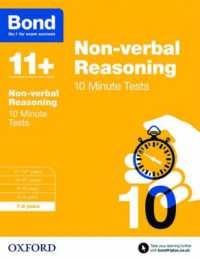Full Description
This wide-ranging survey of issues in intercultural language teaching and learning covers everything from core concepts to program evaluation, and advocates a fluid, responsive approach to teaching language that reflects its central role in fostering intercultural understanding.
Includes coverage of theoretical issues defining language, culture, and communication, as well as practice-driven issues such as classroom interactions, technologies, programs, and language assessment
Examines systematically the components of language teaching: language itself, meaning, culture, learning, communicating, and assessments, and puts them in social and cultural context
Features numerous examples throughout, drawn from various languages, international contexts, and frameworks
Incorporates a decade of in-depth research and detailed documentation from the authors' collaborative work with practicing teachers
Provides a much-needed addition to the sparse literature on intercultural aspects of language education
Contents
Acknowledgments viii
1 Introduction 1
Language, Culture, and Language Education 1
The Concept of Method 2
Critiques of Method 3
Moving beyond Methods 4
About this Book 7
2 Languages, Cultures, and the Intercultural 11
Understanding Language 11
Language as a structural system 12
Language as a communicative system 13
Language as social practice 13
Concluding comments 16
Understanding Culture 17
Cultures as national attributes 18
Cultures as societal norms 19
Cultures as symbolic systems 20
Cultures as practices 20
Culture for language teaching and learning 21
The Intercultural: Understanding Language, Culture, and their Relationship 25
3 Second Language Acquisition, Language Learning, and Language Learning within an Intercultural Orientation 31
Introduction: Two Families of Theories 31
Key Understandings of SLA and Language Learning within Diverse Families of Theories 33
A Brief History of the Development of Theories of Language Learning 35
The Acquisition and Participation Metaphors 40
Expanding Learning: Recognizing the Role of Interpretation in "Moving Between" Linguistic and Cultural Systems 43
Conclusion 45
4 Language Teaching and Learning as an Intercultural Endeavor 47
Introduction 47
The intercultural in language learning 48
The Learner as Focus 51
Language learner as learner 51
Language learner as language user 52
The learner as person 54
The learner as focus: Concluding comments 56
Principles for Teaching and Learning Languages from an Intercultural Perspective 56
Practices for Intercultural Learning 59
Practices in learning 59
Conclusion 61
5 Designing Classroom Interactions and Experiences 63
Expanding "Tasks" to Focus on Interaction and Experiences 64
The Nature of Interaction 66
The Experiential Dimension 66
Considerations in Developing Interactions and Experiences 68
Examples 70
Example 1: Year 10 Chinese - examining translation 70
Example 2: Year 11 and 12 Indonesian: Developing intra- and intercultural understanding 75
Implications for Teachers and Students as Participants in Language Learning 81
6 Resources for Intercultural Language Learning 83
Textbooks as Resources for Intercultural Learning 84
Moving Beyond Textbooks 91
The Authenticity of the Resource 93
Literature as an Authentic Resource 95
Communities as Resources 97
The Classroom as a Resource 99
Selecting and Evaluating Resources 101
Adapting Resources 102
Using Resources Critically 103
Relating Resources to Each Other 104
Concluding Comments 105
7 Technologies in Intercultural Language Teaching and Learning 107
Introduction 107
Information Technologies and Intercultural Learning 108
Social Technologies and Intercultural Learning 111
Developing the Potential of Technologies for Intercultural Learning 118
Technology as information resource 119
Technology as content contextualization 119
Technology as communication tool 119
Technology as a construction kit 120
Technology as visualization and manipulation 120
Summary 120
8 Assessing Intercultural Language Learning 123
Contextualizing Assessment and Language Learning 124
The tension between traditional and alternate assessment paradigms 124
The institutional character of assessment 127
Understanding the Process of Assessment 128
Conceptualizing 129
Eliciting 131
Judging and validating 137
The need for experimentation 140
9 Programming and Planning 143
Programs and Programming in a Traditional Perspective 143
Conceptualizing Content for Language Teaching and Learning 144
Structural understandings of content 144
Communicative understandings of content 145
Content-based language teaching 147
Concept-based understandings of content 148
Content for intercultural language teaching and learning 148
Planning for Complexity 150
Planning for Conceptual Learning 152
Long-Term and Short-Term Planning 156
Planning whole of learning 157
Planning a course 159
Planning a unit of work 159
Planning a lesson 165
The Place of Context in Planning Programs 165
Conclusion 166
10 Evaluating Language Programs 167
Nature and Purpose of Program Evaluation 168
Paradigms that Shape Program Evaluation 169
The Process of Evaluation 171
The Principles for Teaching and Learning Languages and Implications for Evaluation 174
Evaluation and Teacher Professional Learning 177
Conclusion 177
References 179
Index 195








